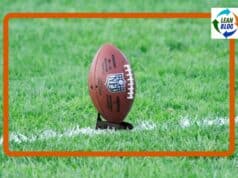Mark's Note: Today's post is a guest post from a new blogger, Chad Walters. Chad and I share a strong interest in sports — me as a fan and Chad as somebody who is working to bring Lean thinking to sports franchises, stadiums, and sports equipment makers. Chad will have guest posts today and next Friday and, hopefully, as an ongoing contributor. You can read his take on Moneyball via his blog (and here was my take).
 Sports organizations/teams are essentially small businesses having low numbers of employees, important business processes like sales and accounting, offerings for customers, and the need to attract new customers and work on improving their offerings to suit customers' needs. The main difference from other industries is the type of offering – products/services versus an additional entertainment experience of “being at the game.”
Sports organizations/teams are essentially small businesses having low numbers of employees, important business processes like sales and accounting, offerings for customers, and the need to attract new customers and work on improving their offerings to suit customers' needs. The main difference from other industries is the type of offering – products/services versus an additional entertainment experience of “being at the game.”
As is the case with traditional small businesses, sports organizations suffer from wasteful activities too. Here are examples of where they turn up at stadiums.
1. Excess Motion: Let's say a ticket window cashier takes an order, fills out a form, walks over to another desk, stamps it, and takes it to a boss for approval. What if the stamp was placed at the window or the approval process eliminated through better cashier training, thereby eliminating some walking? The order is processed faster and the customer's servicing is completed quicker.
2. Transportation: If a stadium refrigerator serving four concourse concession stands is located on a far corner of the stadium, a lot of time is spent moving food items from one end of the stadium to the other. What if the refrigerators were centrally located so that less time can be spent carting burgers and buns? How often are items NOT delivered to point of use?
3. Scrap/Rework: How many times have you ordered a diet soda, only to have been given the sugar-filled version? Not only does it take time to remake the soda correctly, but you're taking time away from serving new customers and you're taking up the time of the customer you improperly served.
4. Overproduction: A minor league team cooked a slew of hot dogs well in advance of a big school event where all of the hot dogs would be provided to children at once. The event was rained out. The hot dogs were thrown away. That's an extreme case, but how often is already-prepared food thrown away after ballgames because it went unsold and couldn't be reused? That's not only food being trashed, but also cold cash being wasted. Teams can either look to implement more kanban or single-piece flow, or try to plan such activities around not needing everything at one time.
5. Excess Inventory: Some teams think that, by buying in large quantities from distributors, they will save money through price breaks. While true, it's also true that the excess food takes up a larger stadium footprint, requires extra refrigerators that use more energy, and food not used right away can and will spoil. Companies like to build up inventory because it makes them feel safe from stockouts and prepared for any emergency situation, but the costs can be burdensome. At the end of the day, it's entirely possible that buying only what you require when you require it will actually turn in a cost savings.
6. Waiting: How often is there a big rush at a concession stand near the start of a game, but late in the event operators are standing around with no customers to service? What if there are three cashiers but only one operational cash register? What if you have hungry customers but are out of buns and can't sell any burgers as a result? The customers will be forced to wait, and perhaps your staff will be forced to wait for buns to be delivered.
7. Overprocessing: This is a unique waste opportunity to spot from a sports perspective, as there are typically few steps in any particular process for concessions or front offices, however they do exist. What if a soda customer doesn't require a lid for her cup, yet one is snapped in place by a worker anyway? The employee could either ask the customer if she wants a lid, or have the lids waiting on the side of the concession stand and allow the customer to take one if she so chooses. What if a ticket taker at a gate bends the perforation four times when two is sufficient for tearing? On a busy day with a long line of patrons, how much time would be saved and waiting reduced by eliminating half of the bends? Many teams have now gone to a ticket scanning system for better data collection and faster gate entry cycle times.
8. Unused Creativity: The most overlooked of the wastes is not adequately applying ideas and concepts from the employees who utilize the processes every day! A ticket window operator might have a good idea on where to place the credit card swipe to improve service time. A post-game cleaning crew member might recommend a new location for an outlet so less time is spent plugging and unplugging heavy duty blowers. A concession stand attendant might realize her stand is almost exclusively used for drinks – what if her stand was converted to a drinks-only stand and the cooking/food employees were moved to where food is ordered more often? This would help with eliminating food spoilage and excess space consumed as it wouldn't be kept where it isn't used.
Every business, large and small, needs to be wary of the existence of process wastes. Sports organizations, despite their non-traditional business structure and unique offerings, are not immune to the effects of inefficiency.
Chad Walters is a Lean consultant and owner of Lean Blitz Consulting in Augusta, Georgia, a firm focused on continuous improvement for small businesses and sports organizations. He has run projects for the Atlanta Braves, the Salvation Army, Automatic Data Processing (ADP), Eaton Corporation, The Dannon Company, and the South Bend Silver Hawks among other companies. He has been practicing Lean and continuous improvement for over eight years, is a Six Sigma Black Belt certified by the American Society for Quality, and received his MBA from Indiana University's Kelley School of Business, where he was a member of the Kelley MBA Sports & Entertainment Academy.
Please scroll down (or click) to post a comment. Connect with me on LinkedIn.
Let’s build a culture of continuous improvement and psychological safety—together. If you're a leader aiming for lasting change (not just more projects), I help organizations:
- Engage people at all levels in sustainable improvement
- Shift from fear of mistakes to learning from them
- Apply Lean thinking in practical, people-centered ways
Interested in coaching or a keynote talk? Let’s talk.









[…] I provided a guest blog post on finding the eight lean wastes at stadiums for Mark Graban at LeanBlog.org. Give it a read here! […]
[…] Mark’s Note: Today’s post is a second guest post from a new blogger, Chad Walters. His first post appeared last Friday. I was happy to be able to meet up with Chad to share some local Dallas BBQ while he was in town […]
[…] here. He’s been a great mentor and he has allowed me the opportunity to guest post for him (here and here are my favorites). He is working on a relatively-new venture called […]
[…] Guest Post: Finding Waste at the Stadium […]
This is a very interesting topic and goes a long way to prove that Lean is useful in almost all businesses and organizations. Does anyone think that sports stadiums would benefit from Kaizen events, would the cost be worth it?